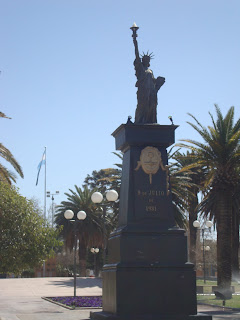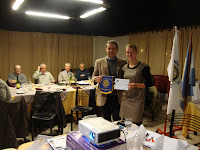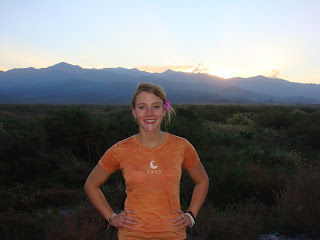After a rather extended hiatus, during which most of my adjusting and reflecting to Mendoza was done personally or through conversations with loved ones, I’ve finally taken up blogging again. I hope you’ll excuse my cyber-negligence during that interval! The plan is to write more actively now, so check in every once in a while if you’re curious what I’m up to.
To begin, a little context:
One of my two principal purposes this year in Mendoza is to take graduate courses in “Policy and Social Planning,” a Masters program offered by the Political Science department of the Universidad Nacional de Cuyo. The other main objective—to be an Ambassador of Goodwill—I will talk about in another post soon. Both opportunities are made possible thanks to the great generosity of the Rotary Foundation, especially that of the good folks that make up the Hillsborough Rotary Club.
UNC is the primary public university in Mendoza and the best in the western Argentina. Overwhelmingly, the top universities in Argentina are the public ones (most notably the University of Buenos Aires), which, in addition to offering a higher-quality education, are also much more affordable than private universities. In fact, in most cases Argentines attend public universities for free!
The political science department has a bit of a reputation around Mendoza. To many, we are at best useless dreamers and at worst crazy revolutionaries. As is the case during oppressive regimes around the world, Argentine Universities were at the heart of the resistance during military dictatorship of the 70s-80s, and in Mendoza the political science department of UNC was one of the leaders of that resistance charge. There are reminders of this history all over the building, from the mural of an approaching army massacring civilians on the university steps that greets you as you walk in the entrance to the scribbling on the bathroom stalls that demands we tear off the yoke of imperialist oppression saddled on us by capitalism and join the association of student communists. Given Mendoza’s majority conservative make up, I get all kinds of interesting reactions when I tell folks what department I’m in, from a sarcastic snicker or a sympathetic “ahh” to an impassioned rant about wasted public spending.

My program is made up of a series of seminars relating to public policy and social programming both in Argentina and in regional and global contexts. Over the year I will complete 8 of these seminars (half that of the full degree). My favorites so far have dealt with human rights policy, education policy and programming, and comparative social policy. Each seminar is taught by an expert in the discipline contracted by the department, a motley crew of academics and professionals including professors from Buenos Aires and Barcelona, a local human rights activist, and a leader of microfinance efforts in Mendoza. The latter was a jovial, eccentric man who, once he learned I was North American, took to calling out “Señorita Williamson” every time he mentioned the U.S. (not infrequently in lectures about global economics), whether or not he proceeded to ask my opinion of whatever US-related issue was at hand. Thus, I was perpetually on edge during his seminar (the first upon my arrival), as his eating-his-words style of speaking and tendency to talk more out the window than toward the students, coupled with my complete inexperience with the Argentine accent, meant I usually had little idea what he was talking about when he called for my country’s input. Sigh.
Half way through, I still don’t have a good idea of how many students are enrolled in the program, as their perpetual coming-and-going during class and not infrequent absences, coupled with the one or two new faces that arrive each seminar, lead me to believe we’ve still never all been in the room at one time. However, if I had to guess I’d say there are around 35-40 of us. We, too, are a motley crew, age-wise and professionally, at least. The youngest students are a couple of Colombians who started the program immediately after university graduation (22yrs old) and the oldest I would put above 50, though the majority are in their 30s-40s. The Colombians, one Peruvian, and I are the only foreigners, and the rest come from various towns and cities around Mendoza and surrounding provinces. The vast majority are working full-time in addition to studying—as sociologists, social workers, economists, teachers, activists, architects, lawyers, public servants and even one police officer—and many have families… which is to say it’s an interesting, engaging group of people who bring diverse perspectives into the classroom and who I see very little of outside of it.
My favorite aspect of the program is the space it provides each student to pursue the material in a personally or professionally relevant way. Evaluation of each seminar is based on a paper submitted at the seminar’s end, the only guidelines of which are to choose an issue related to the topic and material of the seminar and to research and write about it. Thus, though the seminar on Education Policy focused mostly on Argentina, for example, through my final paper I was able to explore and analyze access to higher education for undocumented immigrants around the United States, an issue of great interest to me.
Now, a couple (admittedly generalized) observations about education in Argentina:
- Punctuality is of little concern to students, and if the professor is bothered by its absence, s/he doesn’t let on
- Regular use of one’s cell phone for calls and texts during class time is entirely too permissible
- One of the top entries on the list of legitimate reasons to cancel class may or may not be soccer games (okay… so it was the World Cup, and the entire country does a Jekyll and Hyde complex when it comes to futbol… )
- There is something lost when a campus is less centralized/more departmentalized, there are fewer communal academic spaces, and no one lives anywhere near school (and thus everyone gets on buses and go their separate ways after class)
In addition to a variety of mechanical differences I’ve observed between the Argentine and U.S. classrooms, another, more important educational nuance has been on my mind these months. It relates to the approach to higher education on the whole, and for lack of a better name for the debate, I’ll call it Liberal Arts vs. Vocational Education (or U.S. vs. much of the rest of the world).
I feel like in the U.S. we sometimes like to complain about the functionality of a “liberal arts” education (especially around graduation time when we still haven’t found jobs…). I certainly am guilty of having questioned, if not the value of such and education, at least whether or not it’s the best approach for preparing us to be competitive, successful players and increasingly educated, skilled global arena. When compared with our peers around the world who graduate with “real” skills, already qualified for the professions they are about to enter, this methodological difference can seem an even greater disadvantage.
But more and more I am realizing just how valuable the type of university education we receive in the States is and coming to believe that, in fact, it prepares us better than those peers for the “real world.” It seems to me that, though we may have to continue on and obtain another degree to be officially competitive (whereas in Argentina one graduates university in 5 years with a professional license and many don’t even bother with graduate school), it’s worth it because we graduate both with wider exposure to the issues facing our world today (and their historical roots) and with a better understanding of diverse ways to tackle those issues. The variety of disciplines we must dip into, the breadth of issues we are exposed to and the depth with which we explore them, the mind-bending theoretical discussions and moral debates we are made to have, and the seemingly endless extracurricular offerings on our college campuses—lectures, forums, cultural performances, etc—contribute to making us generally well-rounded, thoughtful citizens when we graduate. No, I probably couldn’t get a job working for an environmental agency or in a health clinic, but at least I’ve been exposed to the issues they work on and have thought about what solutions in their work might look like. Many Argentine students, on the other hand, for having entered University already on track to their profession and without the same mandatory dipping into other departments (or the freedom/time in their class schedules to do so), leave no less intelligent or capable, but often with less exposure to myriad issues outside their profession and fewer tools to confront and deal with them.
I realize this is a generalization and I certainly have met thoughtful, well-rounded people in my surroundings here, of course, but they are fewer and farther between than I found in places like Chapel Hill and New Orleans. I hope I don’t sound condescending... you should all know I’m about the furthest from a west-knows-best/white supremacist as it gets! But nonetheless it’s an impression I’m coming away with and I want to hear your reactions. If you have thoughts on this topic, please speak up!
Interestingly, there is one space I’ve found this impression challenged (and the majority of people thinking critically about a wide range of issues and disciplines) is among my fellow students in the political science department… maybe there’s something to being a “useless, crazy revolutionary” after all…
 nd otherwise adventurers each year and, as such, home to a significant number of outdoorsy-type Argentines who work as mountain guides during the summer months. During a good season, these guides can make almost a year’s worth of wages in just 3 months, and they spend the rest of the year doing odds jobs here and there but mostly just taking advantage of the seemingly endless spectacular climbing spots around Argentina and the region. Lucky for me, I arrived just as the Aconcagua season was winding down and they were eager to get climbing again, so I’ve had some great opportunities to join in these mountain adventures.
nd otherwise adventurers each year and, as such, home to a significant number of outdoorsy-type Argentines who work as mountain guides during the summer months. During a good season, these guides can make almost a year’s worth of wages in just 3 months, and they spend the rest of the year doing odds jobs here and there but mostly just taking advantage of the seemingly endless spectacular climbing spots around Argentina and the region. Lucky for me, I arrived just as the Aconcagua season was winding down and they were eager to get climbing again, so I’ve had some great opportunities to join in these mountain adventures.














